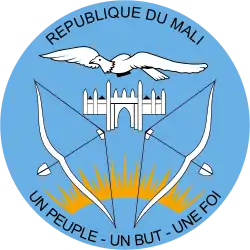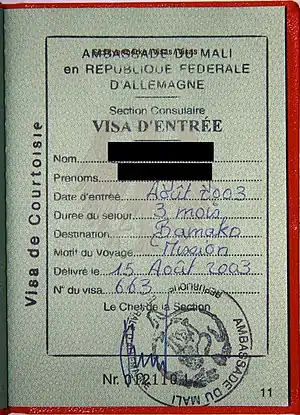Foreign relations of Mali
Following independence in 1960, Mali initially followed a socialist path and was aligned ideologically with the communist bloc. Mali's foreign policy orientation became increasingly pragmatic and pro-Western over time. Since the institution of a democratic form of government in 1992, Mali's relations with the West in general and the United States in particular have improved significantly. U.S.-Malian relations are described by the U.S. Department of State as "excellent and expanding," especially given Mali's recent record of democratic stability in the volatile area of West Africa and its avowed support of the war on terrorism. Mali is reported to be one of the largest recipients of U.S. aid in Africa.[1]
 |
|---|
| This article is part of a series on the politics and government of Mali |
|
|

Mali is active in regional organizations such as the African Union. Working to control and resolve regional conflicts, such as in Ivory Coast, Liberia, and Sierra Leone, is one of Mali's major foreign policy goals. Mali feels threatened by the potential for the spillover of conflicts in neighboring states, and relations with those neighbors are often uneasy. General insecurity along borders in the north, including cross-border banditry and terrorism, remain troubling issues in regional regions.[1]
Although Azawad, a region spanning the expansive north of Mali, was proclaimed independent in April 2012 by Tuareg rebels, Mali has not recognised the de facto state.[2] Britain has closed its embassy; ECOWAS has declared an embargo against Mali, aiming to squeeze out Malinese oil supplies; closed Mali's assets in the ECOWAS regional bank and has prepared a potential intervention force of 3,000 troops. France has declared it will assist in a potential intervention.[3]
Multilateral membership
Mali is a member of the United Nations (and many of its specialized agencies), the International Monetary Fund (IMF), the World Bank, the International Labour Organization (ILO), the International Telecommunication Union (ITU), the Universal Postal Union (UPU) and the International Criminal Court (ICC). It also belongs to the Organisation of African Unity (OAU); Organisation of Islamic Cooperation (OIC); Non-Aligned Movement (NAM); an associate member of the European Community (EC); and African Development Bank (ADB).
Mali is active in regional organizations. It participates in the Economic Community of West African States (ECOWAS) and the West African Economic Monetary Union (UEMOA) for regional economic integration; Liptako-Gourma Authority, which seeks to develop the contiguous areas of Mali, Niger, and Burkina Faso; the Niger River Commission; the Permanent Interstate Committee for drought control in the Sahel (CILSS); and the Senegal River Valley Development Organization (OMVS).
Bilateral relations
| Country | Formal Relations Began | Notes |
|---|---|---|
|
During the Tuareg rebellion of 2012, the Algerian consulate was seized by at least two people wearing explosives belts. Seven hostages were taken, including the consul. In regards to Azawad's UDI, Algeria's Prime Minister has declared it would never "accept questioning Mali's territorial integrity" Algeria has planned to co-ordinate with MNLA to work towards freeing the hostages. | ||
| 21 February 1994 |
Both countries established diplomatic relations on 21 February 1994. | |
| 26 November 1996[4] | ||
| ||
| See Canada–Mali relations
Mali established its embassy in Canada in 1978, with its first appointed ambassador Zana Ousmane Dao,[5] while Canada's embassy in Mali has been open since 1995.[6] Canada has moved from Mali's sixth-largest donor of bilateral official development assistance in 2000 to third-largest in 2007.[7] The value of Canada's exports of goods to Mali exceeded imports from Mali by Cdn.$22m. between 1990-2008.[8] Natural Resources Canada estimated that Canadian mining investment in Mali reached Cdn.$500 million in 2009,[9] and in 2005, 73 mining concessions were held by Canadian firms in Mali.[10]
| ||
| 25 October 1960 | See China–Mali relations
China established diplomatic relations with the Republic of Mali on 25 October 1960.[11]
| |
| ||
| See Finland–Mali relations | ||
|
Mali has a longstanding relationship with France, its former colonial ruler, but relations have been described as ambivalent rather than close. Mali dropped out of the Franc Zone shortly after independence, not rejoining until 1967. One contentious issue between the two nations is the frequent expulsion of illegal Malian immigrants from France since 1996.[1] However, France has played a significant part in helping Mali via military support in the Northern Mali conflict, with soldiers of the two nations' armies working together to take back territory from the rebels.[12]
| ||
| See India–Mali relations | ||
See Libya-Mali relations
| ||
| See Mali–Mauritania relations
Since Mauritania negotiated a boundary dispute with Mali in 1963, ties between the two countries have been mostly cordial.[15] Mali and Mauritania have cooperated on several development projects, such as the OMVS and a plan to improve roads between Nouakchott and Bamako.[15] This cooperation somewhat lessened Mali's dependence on Senegal and Ivory Coast.[15] Although relations were warm with other black African states, since 1965 the orientation of Mauritania's foreign policy has been geared towards relations with North African countries.[15]
| ||
| 23 March 1977 | ||
| See Mali–Netherlands relations | ||
| ||
| See Mali–Poland relations | ||
See Mali–Russia relations
| ||
| 27 September 1990 |
Establishment of diplomatic relations between the Republic of Korea and Mali was on 27 September 1990.
| |
See Mali–Spain relations
| ||
| 1998[18] | ||
| See Mali–United States relations
The bilateral agenda is dominated by efforts to increase broad-based growth, improve health and educational facilities, promote the sustainable use of natural resources, reduce the population growth rate, counter the spread of highly infectious diseases, encourage regional stability, build peacekeeping capabilities, institutionalize respect for human rights, and strengthen democratic institutions in offering good governance. Mali currently is a small market for U.S. trade and investment, but there is potential for considerable growth as its economy expands.[20]
|
References
- Mali country profile. Library of Congress Federal Research Division (January 2005). This article incorporates text from this source, which is in the public domain.
- "Tuareg rebels declare the independence of Azawad, north of Mali". Al Arabiya. 6 April 2012. Retrieved 6 April 2012.
- "Archived copy". Archived from the original on 7 April 2012. Retrieved 2012-04-07.CS1 maint: archived copy as title (link)
- "Mali". mfa.gov.az. Retrieved 24 January 2021.
- L'Ambassadeur Mamadou Bandiougou Diawara, Welcome, Mali Embassy website."Archived copy". Archived from the original on 27 September 2009. Retrieved 11 September 2009.CS1 maint: archived copy as title (link)
- Government of Canada, Canada - Mali Relations, web page, Date Modified: 2009-07-06.
- Organisation for Economic Co-operation and Development. "ODA Total, Net disbursements", OECD.Stat, ODA by Recipient by country, extracted on 30 July 2009 03:34 UTC.
- Industry Canada. "Trade by Product (HS Codes)", Trade Data Online, Trade Type: Trade Balance.
- Government of Canada. Canada - Mali Relations, Modified: 2009-07-06
- Natural Resources Canada. 2006. Canadian minerals yearbook, p.7.23 Archived 4 September 2009 at the Wayback Machine
- http://www.china.org.cn/english/features/focac/183436.htm
- "French army in major Mali pullout". BBC News. 25 May 2013.
- Indian Embassy in Mali
- "Mali Embassy in India". Archived from the original on 18 May 2015. Retrieved 14 May 2015.
- Handloff, Robert E. "Relations with Other African States". In Mauritania: A Country Study (Robert E. Handloff, editor). Library of Congress Federal Research Division (June 1988). This article incorporates text from this source, which is in the public domain.
- Embassy of Mali in the United States
- Embassy of Mexico in Morocco
- "Relations between Turkey and Mali". Ministry of Foreign Affairs of Turkey.
- "Relations between Turkey and Mali".
- "Background Note: Mali". US State Department.